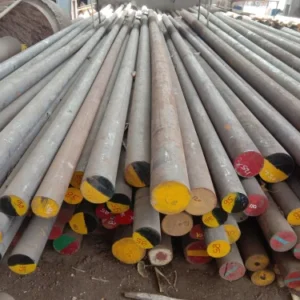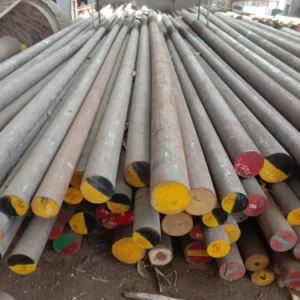Description
20CrMnTi Alloy Steel: Comprehensive Overview
20CrMnTi is a low-carbon, high-alloy steel known for its excellent case hardenability and good mechanical properties. It is commonly used in applications requiring high wear resistance and toughness. The steel’s alloying elements, such as chromium, manganese, and titanium, enhance its hardenability and performance in demanding conditions.
20CrMnTi Grade Introduction
20CrMnTi is designed for applications that require high strength and resistance to wear. It is particularly valued for its excellent hardenability and the ability to be case-hardened, which improves its surface hardness while maintaining a tough core. This steel is often used in automotive and machinery components subjected to high stress and wear.
Chemical Composition
The chemical composition of 20CrMnTi is tailored to achieve optimal hardness, strength, and wear resistance:
| Element | Content (%) |
|---|---|
| Carbon (C) | 0.17 – 0.22 |
| Manganese (Mn) | 0.60 – 0.90 |
| Phosphorus (P) | ≤ 0.035 |
| Sulfur (S) | ≤ 0.035 |
| Chromium (Cr) | 0.90 – 1.20 |
| Titanium (Ti) | 0.10 – 0.25 |
| Silicon (Si) | 0.15 – 0.35 |
Mechanical Properties
20CrMnTi provides robust mechanical properties that make it suitable for high-stress applications:
| Property | Value |
|---|---|
| Tensile Strength (MPa) | ≥ 850 |
| Yield Strength (MPa) | ≥ 600 |
| Elongation Rate (%) | ≥ 12 |
| Impact Toughness (J/cm²) | ≥ 50 |
| Hardness (HB) | 190 – 230 HB |
Hardness
The typical hardness range for 20CrMnTi is between 190 and 230 HB. This range ensures a good balance between surface hardness and core toughness.
Heat Treatment
To achieve the desired properties, 20CrMnTi undergoes several heat treatment processes:
- Hardening:
- Heating: Heat to 850-900°C.
- Quenching: Typically performed in oil or water to achieve high surface hardness.
- Tempering: Performed at 150-200°C to relieve internal stresses and improve toughness.
Physical Properties
20CrMnTi has the following physical properties:
| Property | Value |
|---|---|
| Modulus of Elasticity (N/mm²) | 210 × 10³ |
| Density (g/cm³) | 7.85 |
| Thermal Conductivity (W/m.K) | 20.0 |
Thermal Properties
- Thermal Conductivity: 20.0 W/m.K
Forging Properties
20CrMnTi can be hot-formed within the temperature range of 1100°C to 850°C.
Stress Relieving
Stress relief heat treatment is conducted after cold working to reduce internal stresses and improve dimensional stability.
Normalizing
Normalizing is carried out at 850-900°C, followed by air cooling to refine the microstructure and enhance mechanical properties.
Annealing
Annealing is performed at 850-900°C, followed by slow furnace cooling to relieve stress and improve machinability.
Welding
20CrMnTi has good weldability, although preheating and post-weld heat treatment are recommended to prevent potential issues such as cracking due to its alloy content.
Equivalent Grades
20CrMnTi can be compared to several other steel grades with similar properties:
| Standard | Equivalent Grade |
|---|---|
| GB | 20CrMnTi |
| JIS | SCM420 |
| ASTM | 8620 |
| DIN | 1.7175 |
Applications
20CrMnTi is used in a variety of applications due to its high strength and wear resistance:
- Automotive: Components such as gears, shafts, and other high-load parts that require case hardening.
- Machinery: High-performance machinery components subjected to high stress and wear.
- Forgings: General engineering forgings requiring good hardenability and toughness.
- Tools: Parts in tools and dies that are subjected to high wear conditions.






